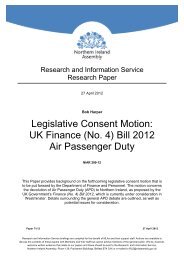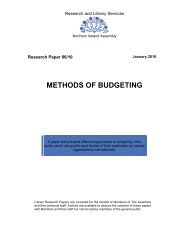Written Answers to Questions - Northern Ireland Assembly
Written Answers to Questions - Northern Ireland Assembly
Written Answers to Questions - Northern Ireland Assembly
Create successful ePaper yourself
Turn your PDF publications into a flip-book with our unique Google optimized e-Paper software.
Friday 20 July 2012 <strong>Written</strong> <strong>Answers</strong><br />
cancellation. Restrictions on data sharing have now been addressed as part of the NFI framework<br />
allowing this administrative issue <strong>to</strong> be addressed.<br />
During the exercise, which identified approximately 15,000 possible cases there were 88 instances<br />
where a deceased cus<strong>to</strong>mer’s SmartPass was used <strong>to</strong> travel on Translink services after the reported<br />
date of death. It is estimated that the resulting cost of this was £4,593.39. These passes have since<br />
been deactivated. Existing controls over the use of Concessionary Fares mean that the individual using<br />
the card must purchase tickets and for the small percentage of cards used inappropriately it is not<br />
possible <strong>to</strong> pursue recovery of the loss incurred because the individual users cannot be identified.<br />
Resilience of the Road Network <strong>to</strong> Severe Weather<br />
Mr D McIlveen asked the Minister for Regional Development what research his Department has carried<br />
out on the resilience of the road network <strong>to</strong> severe weather.<br />
(AQW 13403/11-15)<br />
Mr Kennedy: I can confirm that my Department’s Roads Service has not carried out any specific<br />
research in relation <strong>to</strong> the resilience of the road network <strong>to</strong> severe weather.<br />
However, I can advise that a study was carried out, following the severe winter of 2009/10, <strong>to</strong><br />
determine the extent of the damage caused <strong>to</strong> the network as a result of the severe winter. The study<br />
determined that a conservative estimate of damage caused by the repeated freezing and thawing would<br />
be in excess of £2m.<br />
The study also concluded that the <strong>to</strong>tal cost of the damage, caused solely by the weather during that<br />
winter, may never fully be known, as it would not be practical, or indeed possible, <strong>to</strong> diagnose every<br />
failure that has already led <strong>to</strong>, or is likely <strong>to</strong>, contribute <strong>to</strong> damage in the future.<br />
By and large, well maintained roads, in good condition, suffer relatively little damage from severe<br />
weather. But, where the surface is ageing, or has been damaged by excavation and reinstatement,<br />
water can penetrate in<strong>to</strong> small cracks and other defects in the surface. When the water freezes (often<br />
overnight) it expands, opening up the cracks. During daytime thaws, the ice melts and more water<br />
seeps in, before the next freeze. Repeated freeze thaw cycles gradually open cracks and create cavities<br />
and the surface deteriorates very quickly. Traffic soon displaces the loose aggregate and potholes<br />
form. Most of the damage caused <strong>to</strong> carriageways by severe weather is very obvious, is very localised<br />
(patchy), and occurs where there were already minor defects in the surface.<br />
It is clear that the current level of funding for roads maintenance is no longer sustainable, as the cost<br />
of poor value for money reactive patching is climbing year on year. The underinvestment of previous<br />
spending periods has created a vicious circle, because as pavements deteriorate through a lack of<br />
planned maintenance, they require relatively expensive patching <strong>to</strong> avoid public liability claims and<br />
maintain road safety, which draws further funds away from good value resurfacing and surface dressing.<br />
Furthermore, it is difficult <strong>to</strong> estimate how the level of patching would increase if underinvestment in<br />
structural maintenance continues, because, as the level of underfunding and backlog increases, the<br />
rate of deterioration and the need for patching is also likely <strong>to</strong> increase, as will the damage caused by<br />
severe weather.<br />
Fair Employment Tribunal Case on the Appointment of the Chair of NI Water<br />
Mr McGlone asked the Minister for Regional Development <strong>to</strong> detail the costs incurred by his<br />
Department in relation <strong>to</strong> the Fair Employment Tribunal case on the appointment of the Chair of NI<br />
Water, including a breakdown by legal fees, travel costs and all other expenses.<br />
(AQW 13421/11-15)<br />
Mr Kennedy: I refer <strong>to</strong> the answer I gave <strong>to</strong> AQW 13171/11-15 on 6 July.<br />
WA 606






